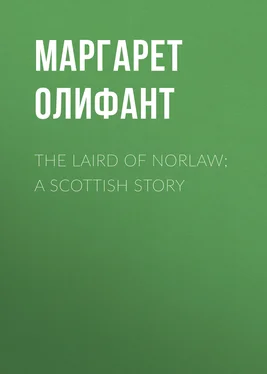Маргарет Олифант - The Laird of Norlaw; A Scottish Story
Здесь есть возможность читать онлайн «Маргарет Олифант - The Laird of Norlaw; A Scottish Story» — ознакомительный отрывок электронной книги совершенно бесплатно, а после прочтения отрывка купить полную версию. В некоторых случаях можно слушать аудио, скачать через торрент в формате fb2 и присутствует краткое содержание. Жанр: foreign_prose, literature_19, foreign_antique, на английском языке. Описание произведения, (предисловие) а так же отзывы посетителей доступны на портале библиотеки ЛибКат.
- Название:The Laird of Norlaw; A Scottish Story
- Автор:
- Жанр:
- Год:неизвестен
- ISBN:нет данных
- Рейтинг книги:3 / 5. Голосов: 1
-
Избранное:Добавить в избранное
- Отзывы:
-
Ваша оценка:
- 60
- 1
- 2
- 3
- 4
- 5
The Laird of Norlaw; A Scottish Story: краткое содержание, описание и аннотация
Предлагаем к чтению аннотацию, описание, краткое содержание или предисловие (зависит от того, что написал сам автор книги «The Laird of Norlaw; A Scottish Story»). Если вы не нашли необходимую информацию о книге — напишите в комментариях, мы постараемся отыскать её.
The Laird of Norlaw; A Scottish Story — читать онлайн ознакомительный отрывок
Ниже представлен текст книги, разбитый по страницам. Система сохранения места последней прочитанной страницы, позволяет с удобством читать онлайн бесплатно книгу «The Laird of Norlaw; A Scottish Story», без необходимости каждый раз заново искать на чём Вы остановились. Поставьте закладку, и сможете в любой момент перейти на страницу, на которой закончили чтение.
Интервал:
Закладка:
“I daresay, mamma,” said Patricia, who had dried her tears, “that people don’t know of it yet; and at the worst it was all papa’s fault—I don’t think we should be afraid to go—it wasn’t our blame, I’m sure.”
“If I should be able, my dear,” said Mrs. Huntley, with her languid sigh—whereupon Patricia exerted herself to arrange her mother’s pillow, and render her sundry little attentions which pleased her.
Poor little Patricia loved “society;” she wanted to shine and to be admired “like other girls"—even the dull dinner-parties of the surrounding lairds excited the fragile little soul, who knew no better, and she spent the rest of the day, oblivious of her former terrors concerning public opinion, in coaxing Mrs. Huntley into betterness; while Joanna, for her part, persecuted Aunt Jean with an unavailing but violent pertinacity, vainly hoping to gain some insight into a family secret. Patricia was successful in her endeavors; but there never was a more signal failure than that attack upon Aunt Jean.
CHAPTER XV
“Bless me callants! what are ye doing here?” said Marget, looking in at the door of the mid-chamber, where Huntley and Patrick Livingstone were together.
It was a small apartment, originally intended for a dressing-room, and communicating by a door locked and barricaded on both sides with the east room, which was the guest-chamber of the house. Almost its sole piece of furniture was a large old-fashioned mahogany desk, standing upon a heavy frame of four tall legs, and filling half the space; it was not like the bureau of romance, with that secret drawer where some important document is always being discovered. The heavy lid was held open by Huntley’s head, as he carried on his investigations. There were drawers enough, but they were all made by the hand of the joiner of Kirkbride, who knew nothing of secret contrivances—and these, as well as all the remaining space of the desk, were filled with the gatherings of Norlaw’s life, trifles which some circumstance or other made important to him at the moment they were placed there, but which were now pathetic in their perfect insignificance and uselessness, closely connected as they were with the dead man’s memory. Old letters, old receipts, old curiosities, a few coins and seals, and trifling memorials, and a heap of papers quite unintelligible and worthless, made up the store. In one drawer, however, Huntley had found what he wanted—the will—and along with it, carefully wrapped in at least a dozen different folds of paper, a little round curl of golden hair.
They were looking at this when Marget, whose question had not been answered, entered and closed the door. The lads were not aware of her presence till this sound startled them; when they heard it, Huntley hurriedly refolded the covers of this relic, which they had been looking at with a certain awe. Eye of stranger, even though it was this faithful old friend and servant, ought not to pry into their father’s secret treasure. The Mistress’s hair was of the darkest brown. It was not for love of their mother that Norlaw had kept so carefully this childish curl of gold.
“Laddies,” said Marget, holding the door close behind her, and speaking low as she watched with a jealous eye the covering up of this secret, “some of ye’s been minding the Mistress of auld troubles. I said to myself I would come and give you a good hearing—the haill three—what’s Mary o’ Melmar to you?”
“Did my mother tell you?” asked Huntley, with amazement.
“Her, laddies! na, it’s little ye ken! her name the like o’ that to the like o’ me! But Cosmo behoved to ask about the story—he would part with his little finger to hear a story, that bairn—and ’deed I ken fine about it. What for could ye no’ speak to me?”
“There was more than a story in Huntley’s thoughts and in mine,” said Patrick, shutting up the desk with some decision and authoritativeness.
“Hear him! my certy! that’s setting up!” cried Marget; “I ken every thing about it for a’ you’re so grand. And I ken the paper in Huntley’s hand is the will, and I ken I would run the risk o’ firing the haill house, but I would have burnt it, afore he got sight o’t, if it had been me.”
“Why?” said Huntley, with a little impatience. It was not possible that the youth could read this bequest conferring Melmar, failing the natural heiress, on his father and himself, without a thrill of many emotions. He was ambitious, like every young man; he could not think of this fortune, which seemed almost to lie within his reach, without a stirring of the heart.
“It did nothing but harm to your father, and it can do nothing but mischief to you,” said Marget, solemnly; “you’re young and strong, and fit to make a fortune. But I tell you, Huntley Livingstone, if you attempt to seek this lass over the world, as your father did, you’re a ruined man.”
“Neither Huntley nor me believe in ruined men,” said Patie; “we’ll take care for that—go to your kye, and never mind.”
“Don’t be angry, Marget,” said Huntley, who was more tender of the faithful retainer of the house; “trust us, as Patie says—besides, if she should never be found, Melmar’s mine.”
“Eh, whisht, lad! she’ll come hame with half a dozen bairns before e’er your feet’s across the door,” cried Marget; “tell me to trust you, that are only callants, and dinna ken! Trust me, the twa of you! Gang and spend a’ the best years of your life, if you like, seeking her, or witness that she’s dead. If ye find her, ye’re nane the better, if ye dinna find her, ye’re aye deluded with the thought of a fortune ye canna claim—and if ye get word she’s dead, there’s still Melmar himself, that was bred a writer and kens a’ the cheats of them, to fight the battle! They might say it was a false will—they might say, Guid forgive them! that Norlaw had beguiled the auld man. There’s evil in’t but nae guid; Huntley, you’re your father’s son, you’re to make his amends to her. Dinna vex the Mistress’s life with Mary of Melmar ony mair!”
“The short and the long of it all, Marget,” said Patrick, who was at once more talkative and more peremptory than usual—“is, that you must mind your own business and we’ll mind ours. Huntley’s not a knight in a story-book, seeking a distressed lady. Huntley’s not in love with Mary of Melmar; but if she’s to be found she shall be found; and if she’s dead my brother’s the heir.”
“No’ till you’re done wi’ a’ her bairns,” cried Marget; “say there’s nae mair than three of them, like yoursels—and the present Me’mar’s been firm in his seat this thirteen years. Weel, weel, I daur to say Patie’s right—it’s nae business o’ mine; but I’d sooner see you a’ working for your bread, if it was just like laboring men, and I warn ye baith, the day’s coming when ye’ll think upon what I say!”
Marget disappeared, solemnly shaking her head as she said these last words. For the moment, the two youths said nothing to each other. The desk was locked softly, the will placed in an old pocket-book, to be deposited elsewhere, and then, for the first time, the young men’s eyes met.
“She’s right,” said Patie, with sudden emphasis; “if you seek her yourself, Huntley, you’ll neither get Me’mar nor fortune—it’s true.”
Huntley paid little attention to his brother. He stood looking out from the window, where, in the distance, to the north, the banks of Tyne rose high among the woods of Melmar—opposite to him, fertile fields, rich in the glow of coming harvest, lay the wealthy lands of his father’s enemy—those lands which perhaps now, if he but knew it, were indisputably his own. He stood fascinated, looking out, tracing with an unconscious eagerness the line of the horizon, the low hills, and trees, and ripening corn, which, as far as he could see before him, were still part of the same inheritance. He was not a dreamy boy like Cosmo—he thought little of his father’s old love, or of the triumph of restoring her to her inheritance. The Mary of Norlaw’s fancy was but a shadow upon the future of his own. He thought, with a glow of personal ambition, of the fair stretch of country lying before him. Generous, high-spirited, and incapable of meanness, Huntley still had the impulse of conquest strong within him. He could not but think, with a rising heart, of this visible fortune which lay at his feet and seemed to be almost within his grasp. He could not but think, with indignant satisfaction, of unseating the false heir whose enmity had pursued Norlaw to the very grave. All the excitement which had gathered into these few past weeks still throbbed in Huntley’s heart and stirred his brain. He could not moderate the pace of his thoughts or subdue his mind at anybody’s bidding. If it should be hard to get justice and a hearing for his claims, this very difficulty increased the attraction—for it was his claims he thought of while the others were thinking of Mary of Melmar. He was not selfish, but he was young, and had an ardent mind and a strong individual character. Mary of Melmar—a white ghost, unreal and invisible—faded from his mind entirely. He thought, instead, of the man who had arrested Norlaw’s funeral, and of the inheritance of which he was the rightful heir.
Читать дальшеИнтервал:
Закладка:
Похожие книги на «The Laird of Norlaw; A Scottish Story»
Представляем Вашему вниманию похожие книги на «The Laird of Norlaw; A Scottish Story» списком для выбора. Мы отобрали схожую по названию и смыслу литературу в надежде предоставить читателям больше вариантов отыскать новые, интересные, ещё непрочитанные произведения.
Обсуждение, отзывы о книге «The Laird of Norlaw; A Scottish Story» и просто собственные мнения читателей. Оставьте ваши комментарии, напишите, что Вы думаете о произведении, его смысле или главных героях. Укажите что конкретно понравилось, а что нет, и почему Вы так считаете.












